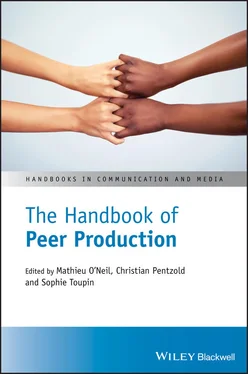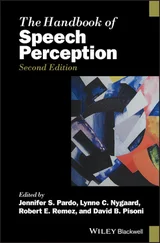33 Kreiss, D., Finn, M., & Turner, F. (2011). The limits of peer production. New Media & Society, 13(2), 243–259.
34 Kriplean, T., Beschastnikh, I., McDonald, D. W., & Golder, S. (2007). Community, consensus, coercion, control. Proceedings ACM Conference on Supporting Group Work, Sanibel Island, FL (pp. 167–176).
35 Lakhani, K. R., & Von Hippel, E. (2003). How open source software works: “Free” user‐to‐user assistance. Research Policy, 32(6), 923–943.
36 Lawrence, T., Suddaby, R., & Leca, B. (2009). Introduction: Theorizing and studying Institutional work. In T. Lawrence, R. Suddaby, & B. Leca (Eds.), Institutional work (pp. 1–27). Cambridge: Cambridge University Press.
37 Lessig, L. (1999). Code and other laws of cyberspace. New York, NY: Basic Books.
38 Levy, S. (1984). Hackers. Heroes of the computer revolution. New York, NY: Penguin.
39 Lih, A. (2009). The Wikipedia revolution. New York, NY: Hyperion.
40 March, J. G., & Olsen, J. P. (1989). Rediscovering institutions. New York, NY: Free Press.
41 Markus, M. (2007). The governance of free/open source software projects. Journal of Management & Governance, 11(2), 151–163.
42 Mateos‐García, J., & Steinmueller, W. (2008). The institutions of open source software. Information, Economics and Policy, 20(4), 333–344.
43 Moon, J. Y., & Sproull. L. (2000). Essence of distributed work. First Monday, 5(11). Retrieved from http://firstmonday.org/ojs/index.php/fm/article/view/801/710
44 Morgan, J. T., Mason, R. M., & Nahon, K. (2012). Negotiating cultural values in social media: The case of Wikipedia. Proceedings 45th Hawaii International Conference on System Sciences, Waikoloa, HI (pp. 3490–3499).
45 Morgan, J. T., & Zachry, M. (2010). Negotiating with angry mastodons. Proceedings 16th ACM International Conference on Supporting Group Work, Sanibel Island, FL (pp. 165–168).
46 Müller‐Birn, C., Dobusch, L., & Herbsleb, J. (2013). Work‐to‐rule. The emergence of algorithmic governance in Wikipedia. Proceedings 6th International Conference on Communities and Technologies (C&T’13), Munich (pp. 80–89).
47 Niederer, S., & van Dijck, J. (2010). Wisdom of the crowd or technicity of content? Wikipedia as a sociotechnical system. New Media & Society, 12(8), 1368–1387.
48 Oliver, C. (1992). The antecedents of deinstitutionalization. Organization Studies, 13(4), 563–588.
49 O’Mahony, S. (2007). The governance of open source initiatives. Journal of Management & Governance, 11(2), 139–150.
50 O’Mahony, S., & F. Ferraro (2007). The emergence of governance in an open source community. Academy of Management Journal, 50(5), 1079–1106.
51 O’Neil, M. (2009). Cyberchiefs. Autonomy and authority in online tribes. London: Pluto.
52 O’Neil, M. (2014). Hacking Weber: Legitimacy, critique, and trust in peer production. Information, Communication & Society, 17(7), 872–888.
53 Ostrom, E. (1990). Governing the commons: The evolution of institutions for collective action. Cambridge: Cambridge University Press.
54 Pentzold, C. (2011). Imagining the Wikipedia community. New Media & Society, 13(5), 704–721.
55 Pentzold, C. (2017). Editorial surveillance and the management of visibility in peer production. International Journal of Communication, 11, 2462–2481. doi:1932–8036/20170005.
56 Pentzold, C. (2018). Grounding peer production in practice: Editorial routines and everyday engagement in the “free encyclopedia anyone can edit”. Communication, Culture and Critique, 11(3), 455–474.
57 Raymond, E. S. (1999). The cathedral and the bazaar. Sebastopol: O’Reilly Media.
58 Reagle, J. (2010a). Good faith collaboration. The culture of Wikipedia. Cambridge, MA: MIT Press.
59 Reagle, J. (2010b). Be nice. Wikipedia norms for supportive communication. New Review of Hypermedia and Multimedia 16(1–2), 161–180.
60 Resnick, P., & Kraut, R. E. (2011). Introduction. In R. E. Kraut & P. Resnick (Eds.), Building successful online communities (pp. 1–20). Cambridge, MA: MIT Press.
61 Sadowski, B. M., Sadowski‐Rasters, G., & Duysters, G. (2008). Transitions of governance in a mature open software source community. Information Economics and Policy, 20(4), 323–332.
62 Schroeder, A., & Wagner, C. (2012). Governance of open content creation. Journal of the American Society for Information Science and Technology, 63(10), 1947–1959.
63 Schweik, C. M., & Englisch, R. C. (2012). Internet success. Cambridge, MA: MIT Press.
64 Scott, W. R. (2001). Institutions and organizations. Thousand Oaks, CA: Sage.
65 Searle, J. (1997). The construction of social reality. New York, NY: Free Press.
66 Shah, S. K. (2006). Motivation, governance and the viability of hybrid forms in opensource software development. Management Science, 52(7), 1000–1014.
67 Shaikh, M., & Henfridsson, O. (2017). Governing open source software through coordination processes. Information and Organization, 27, 116–135.
68 Shaw, A., & Hill, B. M. (2014). Laboratories of oligarchy? Journal of Communication, 64(2), 215–238.
69 Shirky, C. (2008). Here comes everybody. New York, NY: Penguin.
70 Stallman, R. (2004). The GNU Project. Retrieved from www.gnu.org/gnu/thegnuproject.en.html
71 Sternberg, J. (2012). Misbehavior in cyber places. Lanham, MD: University Press of America.
72 Stewart, D. (2005). Social status in an open‐source community. American Sociological Review, 70(5), 823–842.
73 Stewart, K. J., & Gosain, S. (2006). The impact of ideology on effectiveness in open source software development teams. MIS Quarterly, 30(2), 291–314.
74 Taylor, C. (2002). Modern social imaginaries. Public Culture, 14(1), 91–124.
75 Tkcaz, N. (2015). Wikipedia and the politics of openness. Chicago: University of Chicago Press.
76 Viègas, F., Wattenberg, M., & Dave, K. (2004). Studying cooperation and conflict between authors with history flow visualizations. Proceedings SIGCHI Conference on Human Factors in Computing Systems, Vienna (pp. 575–582).
77 Viègas, F., Wattenberg, M., & McKeon, M. M. (2007). The hidden order of Wikipedia. Proceedings 2nd International Conference on Online Communities and Social Computing, Beijing, China (pp. 445–454).
78 Vieira, M. S. & de Filippi, P. (2014). Between copyleft and copyfarleft: Advanced reciprocity for the commons. Journal of Peer Production, 4: Value and currency. Retrieved from: https://ssrn.com/abstract=2468731
79 Von Krogh, G., Spaeth, S., & Lakhani, K. R. (2003). Community, joining, and specialization in open source software innovation. Research Policy, 32(7), 1217–1241.
80 Weber, M. (1978). Economy and society. Berkeley, CA: University of California Press. (original publication 1922)
81 Weber, S. (2004). The success of open source. Cambridge, MA: Harvard University Press.
82 Zucker, L. G. (1977). The role of institutionalization in cultural persistence. American Sociological Review, 42(5), 726–743.
5 Cultures of Peer Production
Michael Stevenson
1 Introduction: Peer Production as Cultural Production
How can we make sense of cultures of peer production, which exist in diverse national, cultural and language contexts, span several industries and domains, and comprise a range of different organizational structures? 1Peer production is commonly defined as a mode of production – that is, a social and material structure in which labor takes place. Specifically it is defined as a decentralized mode of production in which a group of participants collaborate on a common project (say, an operating system or an encyclopedia), and in which individuals self‐select for specific parts of an overall project and generally volunteer their time (Benkler, 2002). Given this definition of peer production as a mode of production, it makes little sense to talk about a single culture – defined as a more‐or‐less shared set of values, expressed in a common identity and shared practices – much like it makes little sense to speak of the culture of factories or the culture of firms. In practice, however, there are certainly comparisons to be drawn between the values and practices commonly found in peer production projects, in particular in the well‐known examples of Wikipedia and FOSS production.
Читать дальше


![О Генри - Справочник Гименея [The Handbook of Hymen]](/books/407356/o-genri-spravochnik-gimeneya-the-handbook-of-hymen-thumb.webp)









